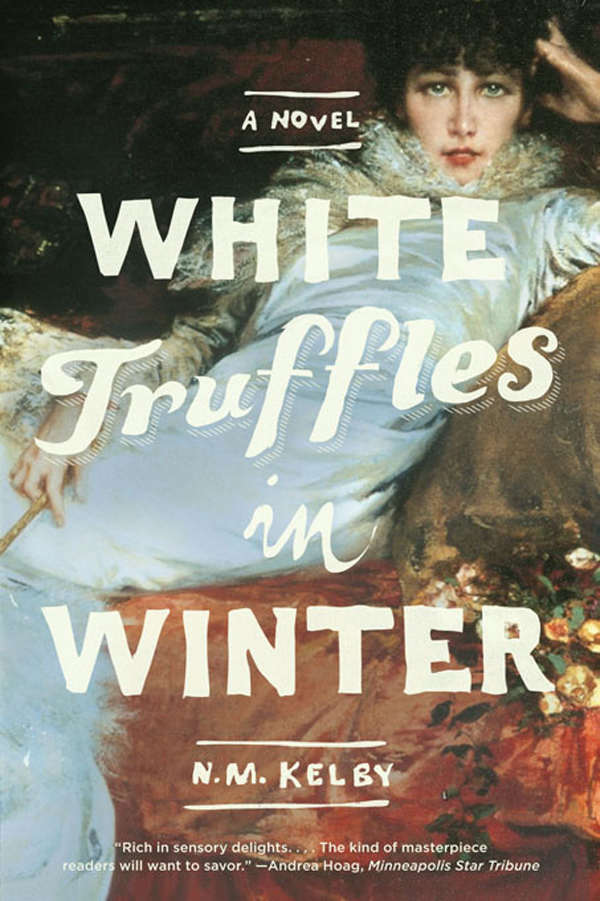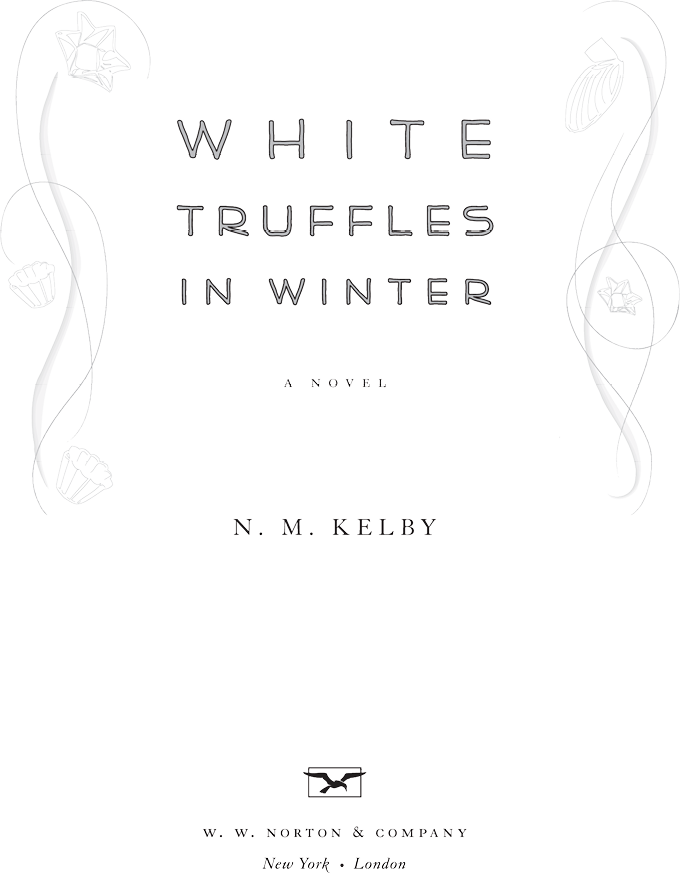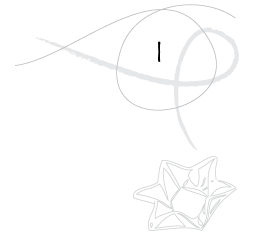White Truffles in Winter
Read White Truffles in Winter Online
Authors: N. M. Kelby


ALSO BY N. M. KELBY
A Travel Guide for Reckless Hearts: Stories
The Constant Art of Being a Writer
Murder at the Bad Girl's Bar and Grill
Whale Season
In the Company of Angels
Theater of the Stars

To Stevenâalways.

CONTENTS
“The day is coming when a single carrot freshly observed will set off a revolution.”
âPAUL C
Ã
ZANNE

T
HAT LAST SUMMER, THE KITCHEN REEKED OF PICKLING
spice, anise seed and juniper berries. Watermelon jam, lavender jellies and crystalized fennel cooled on the pantry shelves. Jars with mango pickles and pickled onions, an old habit from his days in London, were set aside in the wine cellar to cure. Honeycombs were stacked in bowls on the sideboard, draining, waiting to be melted into candles or mixed with olive oil and pressed into soaps. Thunderstorms were canned along with plum jam. Memories seeped onto the pine floorboards. Tears turned to sweat.
Escoffier didn't notice. He was too busy writing his memoirs.
Lushness had returned to Monte Carlo and, surprisingly, to
La Villa Fernand. Monte Carlo was an island of rock floating on the pristine blue waters of Côte d'Azur, leaning into Provence. Embroidered with bougainvillea-covered mansions and villas, it was a fortress, a magical confection, a surreal wedding cake topped with gilded casinos, hotels, and cafés that lit up the night, seemingly spun from sugar and wayward stars. La Villa Fernand,
Escoffier's grand stone manor house, curved along its winding coast. Every evening, clouds crawled over the horizon and pushed the pink sun down into the blinding noise of blue that was the sea.
Quiet. Quiet,
he would think, and keep writing.
At sunset, Madame Escoffier instructed the staff to pull back the curtains and throw open the windows to capture the night air. Black currant pies, tart and sweet, often warmed the cool evenings. The sound of crashing waves against the shore lulled the gaggles of grandchildren, great-grandchildren, grandnieces and grandnephewsâtheir names now interchangeable to Madame and Monsieur Escoffierâto sleep in the evenings. And woke them in the mornings. The air swirled with the gales of laughter.
But it was all just noise to him. Made it difficult to think. Every morning Escoffier wished for evening to come again; the only time he could concentrate was when the house finally fell silent.
In that final year, every triumph was hard won. The first of May had brought an unseasonable heat; waterspouts spun like ballroom dancers across the brilliant sea but never touched ground. Fruit withered on the vine. When the rains finally came, the earth cracked open and drank them whole.
Madame Escoffier found herself dreaming of the first days of their marriage.
“Close your eyes,” he had said to her. “Food demands complete submission.” And then he placed a perfect scallop in her mouth. “Do you taste the sea?”
Delphine did. Not just the salt of the sea but the very air of the moment that the shell was pulled from the sand. “A storm, perhaps. There is a dark edge to the sweetness of the meat. What do you taste?”
“The hand of God.”
That was not surprising. He was, after all, a devout Catholic.
Before Delphine married Escoffier, food was bothersome. A piece of toast, an egg, a handful of greensâit made no difference to her. All she wanted was to write her poetry and be exempt from the foolishness of the world. Love, motherhood, marriageâthey all filled her with disdain. “A woman only needs herself to survive.”
Her father, apparently, had other ideas. Or, at least, that was to be assumed. He used her hand in marriage as a stake during his weekly billiards game.
“You âlost' me?”
“Escoffier played as a man possessed by love,” Paul Daffis told his daughter.
It seemed impossible. Her father was a very good billiards player. For a moment, Delphine thought she'd misheard him. He rarely lost this weekly game and when he did, he always complained that Escoffier had an unfair advantage. “He never has to bend over to sight the cue!”
It was unkind, but accurate. Escoffier was an exceedingly small man.
“Is this some sort of a joke?” she asked.
“It is the perfect love story, is it not?” her father said, hoping for forgiveness.
It was not. Delphine had only met Escoffier a handful of times and always in the company of her father. They were nearly strangers.
“How could this happen?”
“It was quite simple. He said, âToday I shall win.' And I said, âWhat will you bet?' and he said, âAnything you want for the hand of your daughter in marriage.' ”
“I don't understand.”
“I have to admit that I was very partial to the idea of Escoffier's bet. He's such a very talented chef. How could I refuse? A weekly dinner from him would have been heaven.”
“I truly don't understand.”
But she did. It was obvious. Delphine was not unattractive. She had a sturdy beauty with a straightforwardness that suggested an adventurous spiritâand yet her prospects for marriage had been slim. “Too independent,” her father told her, even though he admired the spirit in her. She was, after all, a respected poet and writer. Her independence was what made her successful, fearless even, and yet in the nineteenth century fearlessness was not a desired trait in a wife.
And so Paul Daffis had no choice but to marry off his eldest daughter any way he could. A publisher of antiquities, he was in a business that lacked “vigor,” as he often told Escoffier. Paul had no sonsâjust two little girls, who he called his “surprises,” as both were less than three years of age, and Delphine. If something happened to him, his family would be left destitute. Delphine needed a successful husband and Escoffier was certainly that. He was thirty-four years old: older than Delphine, but not too much older. For many years, he'd served as the
chef de cuisine
at Le Petit Moulin Rouge
â
which, Escoffier was quick to point out, was not associated in any way with the risqué Moulin Rouge cabaret in Montmartre but was a very respectable post at an exquisitely famous restaurant.
It was, however, only open during the summer months, and so he also owned a small grocery store and restaurant in Cannes that he operated during the winter tourist season.
Industrious, hardworking and successfulâEscoffier seemed to be everything a father could hope for for his daughter. The fact that he was slight and delicate-boned as a small child was unsettling to Paul, but he understood his friend to be driven to succeed. Escoffier was the kind of man who would provide well for his daughter and that was all Paul needed to knowâat least that's what he told himselfâand so he took Delphine into his arms and said, “You must trust me. He is an artist in the kitchen. And you are an artist with words. You will be happy.”
She could hear the question in his voice.
He whispered, “He is my friend. I love him as if he were my own son.”
She had no choice.
The next day Escoffier came to claim his bride. Delphine sat on the settee in the parlor, surrounded by trunks and hat boxes. When he came into the room, she did not speak or move but looked at him as if she'd never seen him before. He was pale and nervous, seemingly as uncomfortable as Delphine herself. But he was not unattractive and appeared well groomed for a cookâthat was what he was to her at the time, a laborer. He was, however, impeccably dressed in a cuffed shirt that was stiffly pressed, an extremely expensive dress coatâa Louis-Philippeâand knife-pleated trousers. His dark mustache was manicured and well oiled. He smelled of lavender water and talc. If he were not a cook, he would have been nearly perfect. But he, unfortunately, was a cook.
Delphine could not imagine living the rest of her life with this man.
He is so small,
she thought,
more like a young boy
.
Escoffier seemed to hear her thoughts. His face reddened. He spoke without looking at her, focused on the array of belongings at her feet. “I cannot make you love me,” he said. “Nor do I expect it. I am not unaware that I am a man who is compromised by nature but yet I think that you may find my heart to be most agreeable.”
They sat for a moment, at a loss for words. Behind the parlor door, Delphine could hear her mother, father and baby sisters whispering. When her father cleared his throat, as if to prompt her into speech, Delphine closed her eyes and said, “I have been told that love eventually comes.”
Behind the door, her father popped the cork on the champagne. The bottle overflowed. The effusive wine spilled onto the floor, slipped under the door and puddled at Delphine's feet. The sight of it made her weep.
The early days of their marriage were spent in the kitchen of
Faisan Doré, the Golden Pheasant, Escoffier's café in Cannes. There was no time for a honeymoon; winter season was less than a week away. “A menu must be created,” he had told her as they boarded the overnight train.
The next morning, Escoffier made coffee and left the apartment before sunrise. “Join me,” a note said. When Delphine finally woke, she dressed carefully and walked down the street to take her place at a long kitchen table that Escoffier had set for her alone. There were fine linens and silver, just as in the dining room, and a series of crystal glasses for both water and wine. He placed a fresh bouquet of red roses in a blue Chinese vase.
She had never been in a restaurant kitchen before. It was surprisingly clean and orderly with large windows to let in the light. It was not what she expected at all.
As soon as she sat down, Escoffier began to lecture her as if she were a student.
“Kitchens,” he explained, “need organization, and so I have created a system, a concept that I am working on, a hierarchy, a ranking, a
brigade de cuisine
. Instead of making a cook frantically try to prepare each element on a plate, I have divided the kitchen into certain areas, each run by a
chef de partie
. A plate is moved from chef to chef and assembled as it goes. Someday all kitchens will be run this way.”
Delphine did not really care about how kitchens were run, or would be run, and yet the way he spoke of it, the passion he brought to the work, made it all seem very interesting. Her father had told her that Escoffier had been a cook in the army, and then a prisoner of war. And it was clear. He seemed to have a love of rank and systems that was common for military men. His overwhelming need for order spoke to her of a time lived in chaos.
“I have given this system an extreme amount of consideration and hope someday to perfect it.”
“Professor, will there be an examination later?”
“There will be,” he said and kissed her hand. Delphine blushed for the first time that day, although she was not a woman given to blushing. They had not yet shared a bed.
One by one, Escoffier's staff arrived. After a warm embrace and a series of questions about each man's family, of which Escoffier seemed to have intimate knowledge, they took their stations and work began. Chopping. Peeling. A suckling pig was butchered. A basket of fish filleted. Ducks were plucked and scalded. Everyone had a task.
“Do you not see how brilliant and yet simple this is? Each man is in charge of one element of the dish. When the plate is brought to
poissonier
, he places the fish on it and the
entremetier
adds the vegetable. Each element is given the finest care.”
It's only a kitchen,
she thought.
You're just making something to eat. Fuel for the body and mind. It's not poetry.
But it was. As soon as the cooking began, Delphine could see that. Escoffier would create each dish while the men watched. They in turn would replicate several servings of it. The
brigade de cuisine
allowed the cooks to move like dancers; an orderly rhythm was soon established. The plate traveled from one hand to another. The men moved as verses moved; they built upon each other until the final conclusion.
Slowly, Delphine began to understand that each dish was created, not merely cooked as one would cook a slice of toast. Each had its own beauty and depth: its own poetry.
Course after course, the finished plates were passed among the chefs and sampled with care: small briny oysters from Corsica were nestled into a bed of pink rock salt; white asparagus were trimmed and served alongside a smoked duck salad; cream-fed pork was braised with pears and apples, and new potatoes were browned in duck fat and dusted with late summer truffles. Each dish was more amazing than the last.
After each tasting, the discussion of the chefs was lively. Each chef, no matter what his station was, offered suggestions. There was little praise.
Escoffier sat across from his new wife and studied Delphine very carefully while she ate. He seemed to weigh her response to each dish. It unnerved her.
“And this?” he would ask. The other chefs fell silent and waited for the verdict.
She wasn't exactly sure what he wanted her to say. “It's delicious,” she said time and time again until finally Escoffier could bear those words no longer.
“No. It is not delicious. It has what I call âdeliciousness.' The fifth taste. Bitter, salty, sour, sweet and deliciousness. I tell people this and they think it is all in my mind but it is on your tongue and so deliciousness is there by design. Veal stock imparts it. Someday everyone will recognize this. But that is not what I am asking of you. Think of each plate as you would a poem. It is not enough to say that food is edible or that the words are properly spelled. Where in this alchemy is beauty? Where in this is the nature of the divine?”